Is OfferUp legit? What you need to know before buying or selling
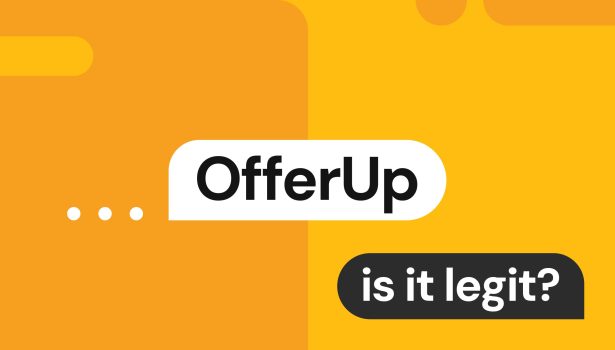
OfferUp is a legitimate platform for buying and selling items both locally and through shipping. It is one of the most popular mobile marketplaces in the U.S., offering features like in-app messaging, user ratings, and payment protection for eligible transactions.
However, like any peer-to-peer platform, OfferUp isn’t risk-free. Staying safe depends on how you use the app: sticking to in-app payments, meeting in public places, and watching for red flags can help you avoid scams and have a positive OfferUp experience.
What is OfferUp?
OfferUp is a mobile-first consumer-to-consumer (C2C) marketplace that allows users to buy and sell items locally or via shipping. It is similar to Facebook Marketplace, Craigslist, and eBay, but stands out for its modern interface, in-app messaging, and focus on simplicity and convenience.
Launched in 2011, it has grown into one of the most downloaded U.S. shopping apps with millions of active users and a diverse range of listings. It also doesn’t hurt that OfferUp acquired a top competitor, letgo, in 2020, and merged the latter’s marketplace into its own—acquiring thousands of new users.
The way it works is quite straightforward: sellers list the items they want to sell, adding photos and descriptions. Buyers can message the sellers directly to ask questions or negotiate the price. Once everything is settled, they can either meet locally in person or use OfferUp’s shipping option.
If shipping is used, the buyer pays through the app and OfferUp provides a shipping label for the seller. For local deals, OfferUp doesn’t process in-person payments, so transactions are handled directly between buyer and seller.
Is OfferUp safe for buyers?
OfferUp is safe for buyers—as long as they take basic precautionary measures and keep an eye out for scammers.
OfferUp buyer protection policies
OfferUp has a 2-day Purchase Protection policy, but it only applies to items shipped and paid for via the app. Whether an item is eligible for shipping is determined by OfferUp, and you can’t pay via the app if you meet with the seller in person.
If a purchase was paid for and shipped using OfferUp, buyers have 2 days to request a refund when an item:
- Is lost in transit (or is never sent)
- Arrives damaged
- Differs from the listing description
- Is counterfeit
If an item doesn’t fit or a buyer doesn’t like it, Purchase Protection doesn’t apply.
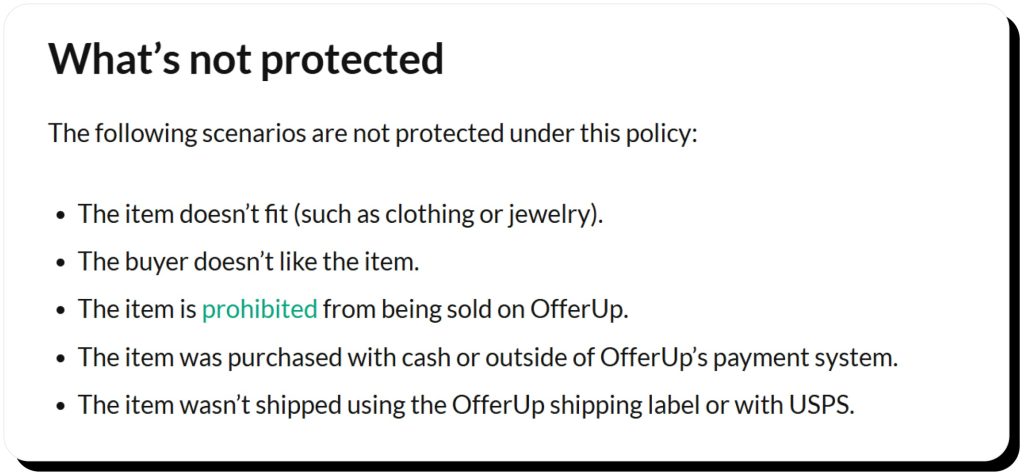
If the seller declines a refund, buyers can escalate the claim and have OfferUp look into it. If the company approves the buyer’s claim, it will provide a prepaid return label with instructions on how to ship the item back and issue a refund.
As for in-person sales, those are considered final and non-refundable. Because of this, it’s crucial to inspect an item thoroughly before paying for it.
Red flags to watch out for
While OfferUp can be a great way to find deals, not every listing and user is trustworthy. Peer-to-peer platforms are especially vulnerable to scams as they typically have less verification and oversight. To avoid becoming a victim, it’s important to educate yourself about the warning signs of potential scams.
Here are some red flags buyers should watch out for before committing to a purchase:
- Requests for communications outside of OfferUp
- Requests for payments outside of OfferUp when shipping is used
- Sellers insisting on paying via methods with little to no buyer protections like Cash App or Zelle
- Unbelievably low prices, even for used items
- Stock photos instead of real images that show the item’s current state
- Requests to cover some fees that aren’t already included in the price
- Unwillingness to meet in a public place for in-person sales
- Evasive answers to your questions and requests
- No ratings from other buyers
While the last point doesn’t guarantee the seller is a scammer (everyone is new to the platform at some point), it’s still better to exercise caution.
Is OfferUp safe for sellers?
OfferUp is safe for sellers, provided they know how to tell a legit buyer from a potential scammer and follow the platform’s guidelines.
OfferUp seller protections
While there’s no specific policy that protects sellers, OfferUp implements several measures to prevent abusive buying behaviors.
- For in-person sales, it’s totally up to the seller whether to issue a refund.
- For shipped items, sellers can decline a refund request. In that case, OfferUp will get involved and review the claim to determine whether it’s legit.
- Sellers can dispute claim resolutions if they believe the decision is incorrect.
- The app helps with shipping and returns by providing labels and tracking.
- If a buyer shows abusive buying behaviors (frequently requests refunds, leaves lots of negative reviews, etc.), OfferUp disallows certain functions like leaving feedback and initiating returns.
Another measure that’s aimed at protecting both sellers and buyers is Community MeetUp Spots. These are well-lit, public spaces designed for conducting in-person deals. Often situated near police stations, they have 24-hour video surveillance and are ADA accessible. The OfferUp app provides a map of the spots and allows sharing your location with other people through messages.
Red flags to watch out for
Scam attempts on OfferUp aren’t just limited to buyers—sellers are often targeted too. From fake overpayments to requests to ship items without confirmation, bad actors continuously come up with new ways to steal money. Here are some common warning signs to look out for:
- Requests to send an item before it’s paid for (or any request to finalize a deal urgently)
- Requests for personal details like full name, phone number, card number, etc.
- Requests to pay outside the app when you ship the item
- Overpayments (especially if the buyer asks to return money via a different payment system)
- Payments via unusual methods (gift cards, wire transfers, etc.)
If you’re doubtful, it’s better to trust your gut and pause the transaction. Another buyer will certainly appear, but your money may be very difficult to get back.
Is OfferUp shipping safe?
OfferUp shipping is safe as long as it is done properly within the system of the app. Whether an item is eligible for shipping is determined by the app based on certain criteria like weight, price, location, and carrier restrictions.
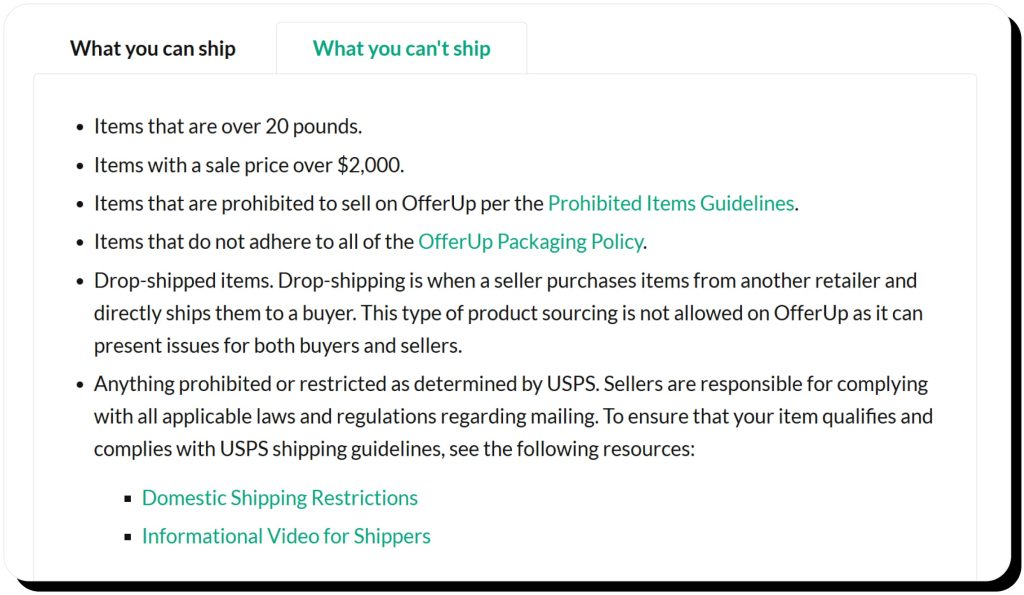
The shipping fees are covered by buyers (they are included in the final price), while sellers cover the service fee (12.9% of the item’s price with $1.99 minimum).
Once OfferUp provides a shipping label, the seller must drop the item off at a USPS-approved location within 5 days. Using other carriers isn’t prohibited but will lead to losing OfferUp protections.
Both buyers and sellers can track the package in the app.
How to protect yourself when shipping items
Shipping items through OfferUp can expand your reach and simplify transactions, but it also comes with certain risks if not handled carefully. Adopt the following practices to protect yourself from scams, disputes, and delivery issues:
- Send packages only with OfferUp labels and avoid using third-party carriers.
- Take pictures of the item before shipping to document its state (in case it arrives at the buyer damaged). Take pictures of the packaging for the same reason.
- Never ship before receiving payment confirmation in the app and never rely on confirmations provided by buyers (those can be fake).
- Pack everything securely to avoid damage during transit.
- Ship only to the buyer’s address shown in the app—scammers may try to convince you to send the item somewhere else to later claim it never arrived.
In case of an incident, having evidence such as photos, receipts, and tracking numbers is vital to win disputes and avoid losing your money.
User reviews and community opinion
OfferUp has predominantly positive reviews in app stores, with 4.4/5 stars in Google Play and 4.8/5 stars in the App Store. Users appreciate how easy it is to use, how quickly local deals are handled, and how convenient the app is overall. However, negative feedback is present as well, with many stating that OfferUp is too loaded with ads and has frequent bugs—messages don’t always show up, the screen freezes, etc.
On forums like Reddit, users also share both success stories and scam warnings, reinforcing that the experience depends heavily on vigilance and common sense.

While it’s clear that OfferUp has work to do to improve its user-friendliness and functionality, it’s up to you to safeguard yourself against scams and follow the best practices to ensure your shopping and selling experience is smooth.
Tips to stay safe on OfferUp
Your ultimate safety depends on you. These are the key guidelines for both buyers and sellers:
- Conduct local transactions only in public spaces, preferably the ones marked as Community MeetUp Spots by OfferUp.
- Whenever possible, handle shipping and payment via the app. Communications must always stay within the app.
- Never give out any personally identifiable information like your number, address, or card details—those aren’t necessary to complete the deal.
- Don’t give in to pressure: avoid transactions that demand urgency or unusual payments, no matter how convincing the story is.
- Document everything: take screenshots of listings and photos of items and packages—these will prove useful if a dispute is initiated.
- Check profiles and ratings to make sure that you’re communicating with an established and reliable user.
- Learn what protections and limitations OfferUp has so that you set realistic expectations.
- Educate yourself on common OfferUp scams to learn what warning signs to pay attention to.
It’s also up to buyers to inspect products thoroughly as in-person sales are non-refundable and shipping sales give only 2 days to request a refund.
Overall, as long as you exercise common sense and instinct, you will be fine. Under appropriate precautions, OfferUp can be an effective method of saving or decluttering.
FAQs
Is OfferUp safe?
OfferUp is safe to buy and sell—provided you take precautions recommended for all peer-to-peer marketplaces. These include using in-app messaging, using OfferUp-provided shipping labels, meeting in public places if you make a local transaction, and learning how to spot scams.
What buyer protection does OfferUp offer?
OfferUp’s Purchase Protection covers only items shipped and paid for using the app. If the item never arrives, is damaged, or differs significantly from its description, buyers have 2 days to request a refund. If a seller denies it, there’s an option to file a claim and have OfferUp look into it. However, transactions handled locally and paid outside the app aren’t covered by the Purchase Protection.
Is OfferUp safer than Craigslist?
OfferUp is generally considered safer than Craigslist due to built-in features like ratings, verified accounts, in-app messaging, and optional shipping with payment protection—none of which are available on Craigslist. However, both platforms still have potential risks, especially during local, in-person transactions.


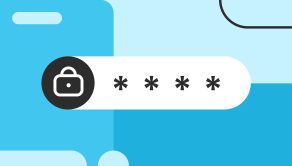

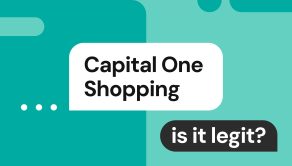
Mark comes from a strong background in the identity theft protection and consumer credit world, having spent 4 years at Experian, including working on FreeCreditReport and ProtectMyID. He is frequently featured on various media outlets, including MarketWatch, Yahoo News, WTVC, CBS News, and others.